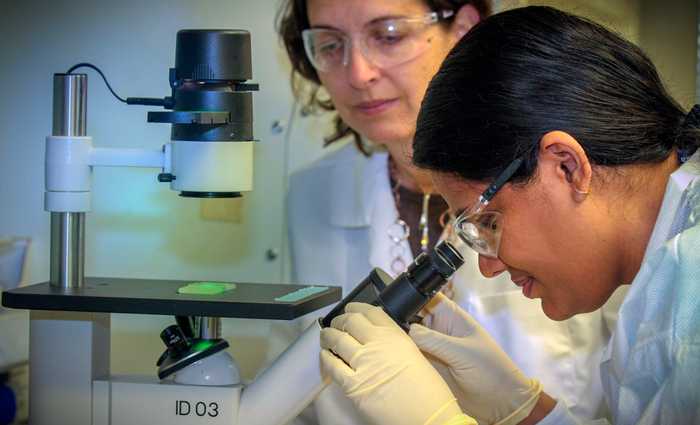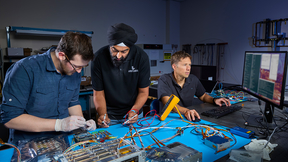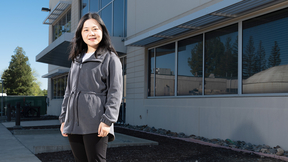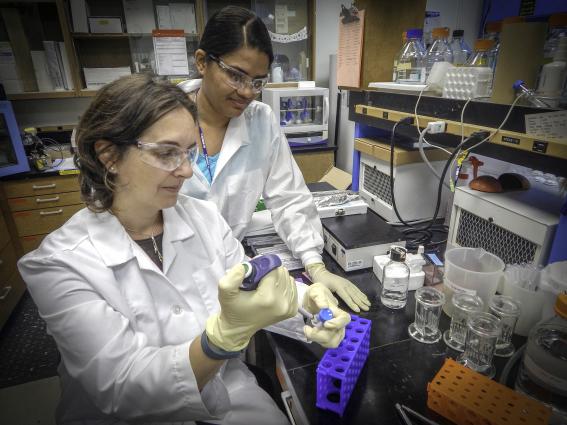Protein curbs spread of prostate cancer to bone
 (Download Image)
LLNL scientists Gaby Loots (left) and Aimy Sebastian count live cells for their research tying a specific protein that has been found to inhibit prostate cancer metastasis to bone. Photos by Julie Russell/LLNL.
(Download Image)
LLNL scientists Gaby Loots (left) and Aimy Sebastian count live cells for their research tying a specific protein that has been found to inhibit prostate cancer metastasis to bone. Photos by Julie Russell/LLNL.
Scientists from Lawrence Livermore National Laboratory, in collaboration with researchers from University of California campuses at Merced and Davis, have found that a specific secreted protein inhibits prostate cancer metastasis to bone.
Their research appears in recent editions of the journals, PLOS ONE and Microarrays.
Prostate cancer is the most frequently diagnosed cancer and the second leading cause of cancer-related deaths among men in the United States. If detected at early stages the prognosis is quite favorable; however, aggressive forms of metastatic prostate cancer spread primarily to the skeleton.
Bone tumors cause great pain, promote fractures and ultimately represent the main cause of morbidity, with a 70 percent incidence documented by autopsies, according to Gabriela Loots, an LLNL biomedical scientists and an associate adjunct professor at UC Merced.
It has been hypothesized that the bone microenvironment serves as a rich "soil" by secreting factors that promote survival and propagation of cancer cells; in turn, tumors secrete factors that alter the bone microenvironment to promote metastatic colonization. Development of new therapies for the prevention and treatment of prostate cancer bone metastasis depends on understanding the dynamic reciprocal interactions between prostate cancer cells and the bone microenvironment.
Yet a study led by Aimy Sebastian, a graduate student in the School of Natural Sciences at UC Merced and is conducting her Ph.D thesis work under Loots, identified the secreted bone protein Sclerostin (SOST) as a key molecule dysregulated as a result of prostate cancer-bone microenvironment interactions.
This study, published in the journal Microarrays, shows that lack of SOST in the bone microenvironment promotes the expression of many genes associated with cell migration and/or invasion, including long non-coding RNA MALAT1 in prostate cancer, suggesting that SOST has an inhibitory effect on prostate cancer invasion.
A second study, led by Bryan Hudson, a postdoc fellow, and LLNL biomedical scientist Nicholas Hum, looked into the role of SOST in regulating prostate cancer invasion and metastasis. They found that SOST inhibits prostate cancer invasion in vitro. To determine whether SOST impacts metastasis in animals, they modified a prostate cancer cell line to overexpress SOST, engrafted various cells lines onto immunodeficient mice, and quantified the rate of secondary tumors and of osteolytic bone lesions. They found that cells producing more SOST had significantly lower rates of metastasis. In addition, with the help of Blaine Christiansen, an assistant professor in the Department of Orthopedic Surgery at UC Davis, they found that cells expressing more SOST induced significantly less osteolytic bone loss. These results provided strong evidence that SOST has an inhibitory effect on prostate cancer metastasis to bone.
Additional LLNL contributors include Cynthia Thomas, Ayano Kohlgruber, Nicole Collette and Matthew Coleman.
This work was supported by LLNL’s Laboratory Directed Research and a developmental grant from UC Davis Cancer Center.
Contact
 Anne M. Stark
Anne M. Stark
[email protected]
(925) 422-9799
Related Links
Researchers track down cause of a disfiguring bone diseaseaseLab, UC Davis partner to personalize cancer medications
Bone research paper selected for inclusion in the Faculty of 1000 database
Tags
Laboratory Directed Research and DevelopmentPhysical and Life Sciences
Featured Articles








